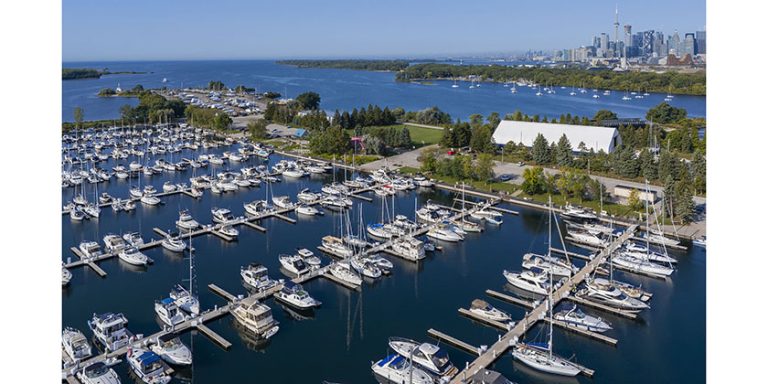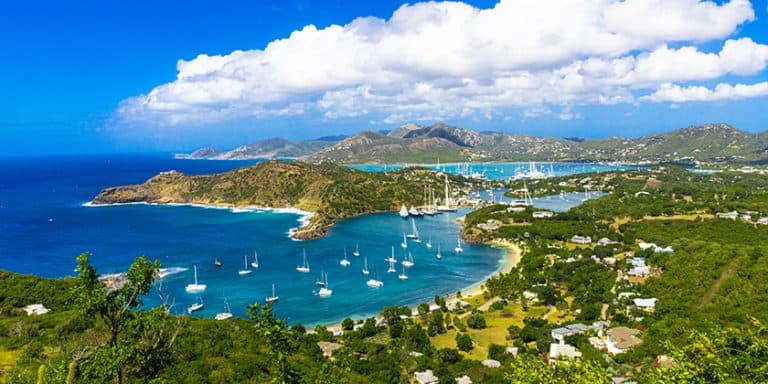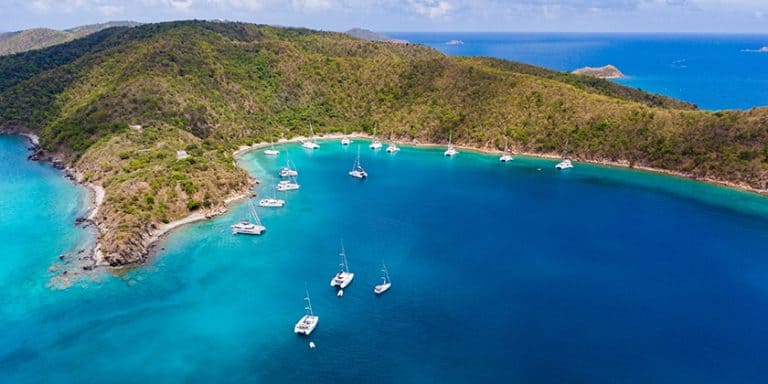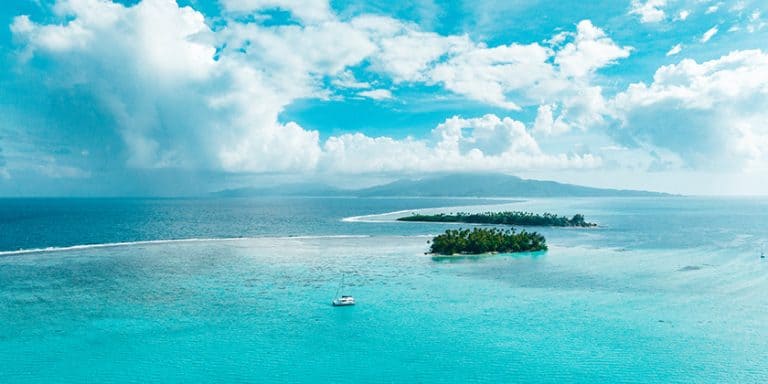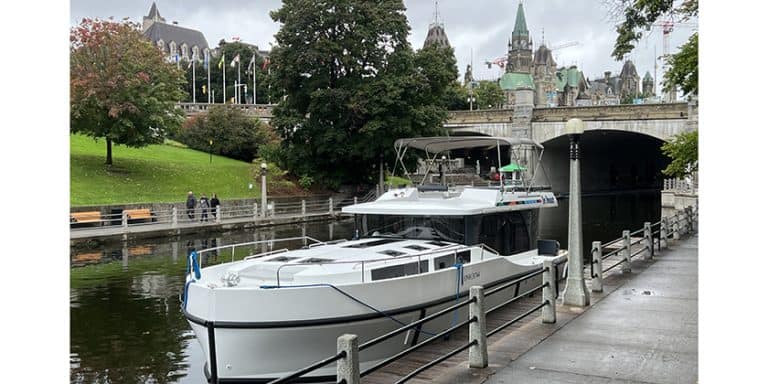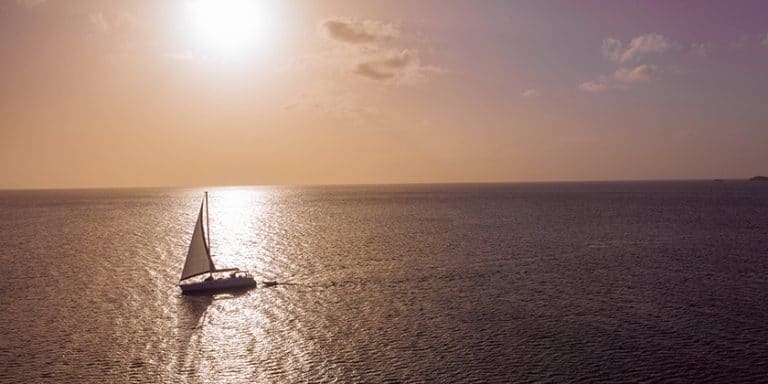Heritage and hip: Kingston as a port destination
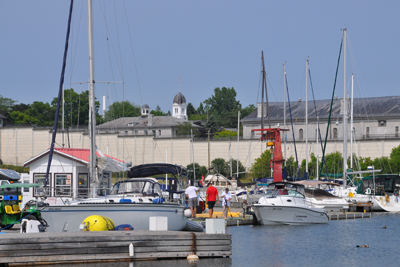
Exploring the fresh-water sailing capital of Canada
By Amy Hogue
Cruise into the city of Kingston, Ontario, and it will quickly become clear that this city and surrounding waterways have something special. Built around the northern shore of Lake Ontario, Kingston is the place to go if you love to explore new waterways, fantastic views, and exceptional boating opportunities.
Sitting at the intersection of three world-class Canadian bodies of water, Lake Ontario, the St. Lawrence River, and the UNESCO World Heritage Site, the Rideau Canal (Cataraqui River from Kingston to Newboro), the water’s influence is deeply woven into Kingston’s culture and history. Well known as the city that gave the Canadian band The Tragically Hip its start in the music scene, Kingston is vibrant, cultured, and steeped in water lore, yet still manages to maintain the quintessential small-town feel that will make boaters feel at home.
Considered one of the best spots for fresh-water sailing in the world, Kingston boasts steady winds and open waters that make it a popular spot for any kind of water activity, from sailing to power boating. Well-known in the boating world for hosting the sailing portion of the 1976 Olympics, the city of Kingston has more than eight kilometres of waterfront, two downtown municipal marinas, and seven boat launches.
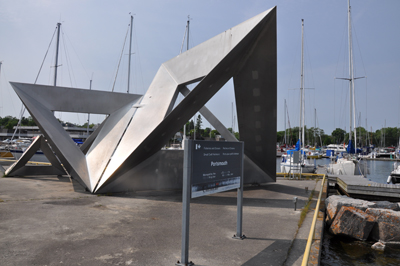 Portsmouth Olympic Harbour Marina hosted the sailing competition in the 1976 Olympics, a testament to the unique sailing conditions in the area. The marina has 250 slip finger docks and can accommodate power and sail boats
Portsmouth Olympic Harbour Marina hosted the sailing competition in the 1976 Olympics, a testament to the unique sailing conditions in the area. The marina has 250 slip finger docks and can accommodate power and sail boats
Boaters will find cruising in and around Kingston and the 1000 Islands area is comparatively smooth sailing, with a mix of anchorages tucked into small coves or between islands, along with plenty of opportunities for open water where you can really let loose and feel the wind in your hair.
Seasoned sailor Richard McFarlane spends his summers on his 28-foot pocket yacht traveling throughout the Kingston area, and his winters on his sailboat in Florida. A veritable expert on the area’s waterways, McFarlane calls the water around Kingston “challenging” for those unfamiliar with the area.
“Know your charts and stay inside your markers unless you have local knowledge of the water,” McFarlane cautions.
McFarlane took his first sailing lessons at the Kingston Yacht Club and has nearly two decades of experience in the Kingston and 1000 Island areas, logging over 7,000 nautical miles on Lake Ontario and the 1000 Islands as far east as Cornwall. One benefit to Kingston McFarlane noted is that you can get pretty much anywhere from its waterways.
McFarlane isn’t wrong – whether you’re looking for a short-term or long-term adventure, it can all begin (or end) with Kingston. From here you can cruise along the St. Lawrence River, past Montreal and Quebec City, and on to the Atlantic Ocean, or you can explore Lake Ontario and access any of the Great Lakes and adjacent waterways. For more sedate travel, you can cruise the 202-kilometres of the Rideau Canal between Kingston and Ottawa, and see the historic locks operating just as they would have a hundred years ago.
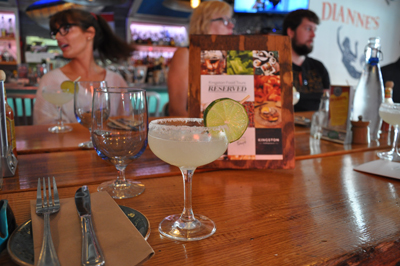 The Kingston Food Tour is a fun way to get the lowdown on Kingston’s history, and enjoy sampling local foods at the same time. Any tour that starts off with a margarita is a good one!
The Kingston Food Tour is a fun way to get the lowdown on Kingston’s history, and enjoy sampling local foods at the same time. Any tour that starts off with a margarita is a good one!
When in Kingston, two downtown marinas will make sure you are right in the thick of things and only a short walk from most downtown destinations. Boaters can choose between Confederation Basin Marina, located directly across from City Hall and the Kingston Visitor Centre, or Portsmouth Olympic Harbour, the location of the ’76 Olympics, located beside Kingston Penitentiary. Other marinas dot the shoreline both east and west of the city.
To get around in the city, you can rent a bike, stand-up paddleboard, or kayak from Ahoy Rentals, right in downtown Kingston, or purchase a pass to hop on board Kingston’s hop-on-hop-off trolley service that will take you to all the visitor hotspots. From Kingston Penitentiary, to Fort Henry, Bellevue House, the Pumphouse Museum, and Market Square, there’s plenty to see and do in Kingston.
One of the city’s biggest tourism champions is Chris Whyman, who shares Kingston’s story with visitors in his official capacity as Town Crier. You may spot Whyman out on the streets during special events in Kingston, proclaiming its history loud and clear, and in particular its waterside heritage.
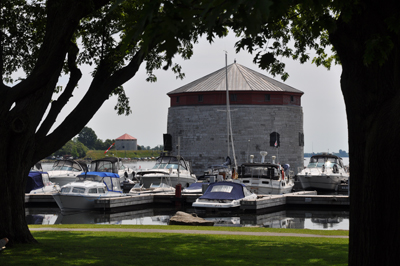 Kingston’s Martello towers are reminders of Kingston’s military significance as guardian of the Rideau Canal and Canada’s interior. There are only 11 Martello towers left in Canada, four of which are located in Kingston.
Kingston’s Martello towers are reminders of Kingston’s military significance as guardian of the Rideau Canal and Canada’s interior. There are only 11 Martello towers left in Canada, four of which are located in Kingston.
“We have so many visitors who come here by boat,” Whyman said, “One of the unique things about Kingston is when you get off your boat, you’re right in the heart of Kingston, where you’ll find live music, patios, restaurants, and a rich and vibrant community where there’s always something happening.”
Whyman isn’t kidding when he talks about Kingston’s restaurant scene: Kingston has the highest restaurants per capita of any city in Canada, and that translates into more selection, more competition, and excellent dining destinations. It’s that same culinary excellence that fostered the Kingston Food Tour, a three-hour tour that offers a crash course on Kingston’s history, architecture, and an inside scoop on everything from the city’s ghosts to prison escapes and shipwrecks.
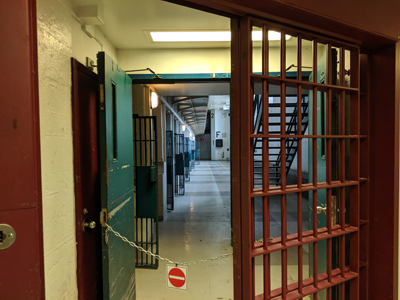 A visit to Kingston Penitentiary is a unique opportunity to peek inside prison life. The prison opened as a visitor attraction following its closure as an operating penitentiary in 2013.
A visit to Kingston Penitentiary is a unique opportunity to peek inside prison life. The prison opened as a visitor attraction following its closure as an operating penitentiary in 2013.
The water has naturally played an important role in Kingston’s more than 400-year history, from the days when furtrading Europeans used the water as a highway for trapping, to Kingston’s pivotal role during the War of 1812, to its current reputation for sustainable waterfront development.
In fact, Kingston briefly held the title of the capital of Canada from 1841 to 1844, when the capital was relocated to Ottawa due to fears that Kingston’s waterside location would make it vulnerable to attack from the U.S. Despite the shift of government to Ottawa, Kingston remains a pivotal military location to this day.
Visible from the water is the imposing Fort Henry, the largest fortification west of Quebec City, a National Historic Site, and part of the Rideau Canal’s UNESCO World Heritage Site designation. The Rideau Canal itself is a military construction designed for defence of Canada’s interior, with Kingston standing guard at its southern entrance, and Fort Frontenac dates back to 1673 and is still used by the military today.
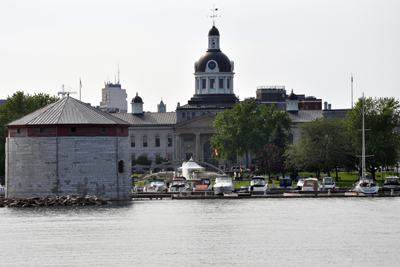 Confederation Basin Marina sits in the heart of downtown Kingston and is a good spot to use as your launchpad for an exploration of the city, the Shoal Tower is visible.
Confederation Basin Marina sits in the heart of downtown Kingston and is a good spot to use as your launchpad for an exploration of the city, the Shoal Tower is visible.
Kingston’s famous Martello towers may also get a second curious glance from boaters. Modelled after a similar structure encountered by the British army in Martello, Corsica, a Martello tower is a round, thick-walled tower that can be used to repel a water invasion when manned by roughly a dozen men. Martello towers were extremely resilient and capable of resisting significant siege activity.
Kingston is home to four Martello Towers – Cathcart Tower, Murney Tower, Fort Frederick, and Shoal Tower. Both Fort Frederick and Murney Towers are open to the public; Murney Tower is now a museum.
Today the city of Kingston focuses on its waterfront for recreational and leisure pursuits, and has been working hard at becoming a “people place” where pedestrian and recreational access to the water has been prioritized.
One example of this is the new Breakwater Park, a study in waterfront placemaking, with large stone boulders used to prevent erosion, headlands and public beaches, and an accessible pier. The Waterfront Trail runs through the park and on a sunny day the lake, trail and park are full of people sunning themselves, swimming, biking, playing sports and all manner of water activities.
“The water here is well used, there’s sailboarding, kite sailing, ice boating, and many major on-water sailing competitions…this is a happening city and waterway,” Whyman said. “When someone pulls into the harbour in Kingston, they’re right in the thick of history. We’re a cool town to live in.”
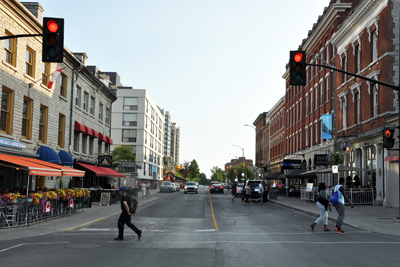 At dusk, the city of Kingston comes to life with restaurants, night clubs and musical venues.
At dusk, the city of Kingston comes to life with restaurants, night clubs and musical venues.
Whyman also noted the opportunities for interesting dives in and around Kingston, in great part due to the many shipwrecks in the area, many of which are accessible for shallow dives that provide a great learning opportunity for beginning divers.
“After the War of 1812 they decreed there would be no more vessels of war in the Great Lakes, and they scuttled over 400 ships from Prince Edward County through the Kingston area to Sackets Harbor in the U.S.,” Whyman said, adding that some of the wrecks are visible beneath the water, including a recently scuttled ferry that is used today as a diving hotspot.
Whyman refers to Kingston as “heritage and hip,” a tongue-in-cheek reference to the Tragically Hip and Kingston’s role in the band’s history, but a stroll through town and it’s clear this reference is true. And at night on the water, when the faint sounds of music drift through the air, it’s pure magic.
Sidebar:
Keeping busy in Kingston:
1. Go behind bars at Kingston Penitentiary
Ever wanted to see first-hand what it’s like in prison, but with the option of exiting the building? Take a tour of Kingston Penitentiary and see what life was like in the prison, the famous riot in 1971, and its closure in 2013. Open spring and summer, with varying hours.
2. Savour Kingston’s food scene
This three-hour tour will take you to the best local restaurants and give you info about Kingston’s history and culture. Ask your guide about why there are so many old buildings made with limestone in Kingston! Tickets required in advance.
3. Walk or bike the Waterfront Trail
Take a walk or bring your bike (or rent one from Ahoy Rentals in downtown Kingston) and explore Kingston’s Waterfront Trail, an eight-kilometre scenic route that is one of the best ways to see the city. Stop for a swim at Breakwater Park.
4. Learn about Kingston’s military history at Fort Henry
Dig a little deeper into Kingston’s military history at Fort Henry, and see what 19th-century military life was all about. The fort is open from mid-May to Thanksgiving, but hours vary depending on the month.
5. See inside a Martello Tower
Don’t miss your opportunity to see inside a piece of Kingston’s military history and visit Murney Tower, a Martello tower dating back to 1846. The tower is open to the public daily from mid-May to Labour Day. Fort Frederick Tower is also open to the public.

